Big Red Book
Celebrating television's This Is Your Life
David CROFT OBE (1922-2011)
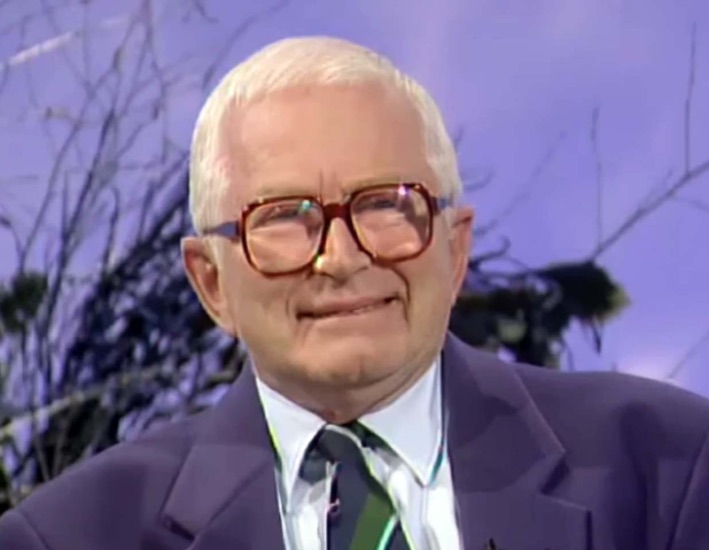
THIS IS YOUR LIFE - David Croft, writer, producer and director, was surprised by Michael Aspel outside the BBC Television Centre in London, having been led to believe he was there for a meeting.
David, who was born into a show business family, began his career as a child actor. He served in the Royal Artillery during the Second World War in North Africa, India and Singapore, and returned to acting after the war. In the 1960s he became a television producer-director, initially with Tyne Tees Television, before relocating to the BBC where he found himself directing early editions of This Is Your Life.
He produced a number of popular BBC sitcoms such as Beggar My Neighbour and Hugh and I, and it was while producing these shows that he met actor Jimmy Perry, with whom he developed and co-wrote nine series of the hugely popular sitcom Dad's Army. At the same time David began to co-write the sitcom Are You Being Served? with Jeremy Lloyd. He would continue both writing partnerships producing several more hit series including It Ain't Half Hot Mum, Hi-de-Hi! and 'Allo 'Allo!.
"You cheating lot! Goodness gracious me! Well, I'm glad I put a good suit on anyway!"
programme details...
- Edition No: 936
- Subject No: 912
- Broadcast date: Wed 20 Dec 1995
- Broadcast time: 7.00-7.30pm
- Recorded: Mon 11 Dec 1995
- Repeated: Thu 21 Dec 1995 2.35pm
- Venue: BBC Television Centre
- Series: 36
- Edition: 16
- Code name: Sherry
on the guest list...
- Clive Dunn
- Bill Pertwee
- Frank Williams
- Ann - wife
- Jimmy Perry
- George Layton
- Renu Setna
- Michael Knowles
- Donald Hewlett
- John Clegg
- Stuart McGugan
- Christopher Mitchell
- Don Estelle
- Melvyn Hayes
- Windsor Davies
- Robin Nash
- Jeffrey Holland
- Felix Bowness
- Su Pollard
- Simon Cadell - son-in-law
- Penny - daughter
- Mollie Sugden
- Wendy Richard
- Nicholas Smith
- Jeremy Lloyd
- Arthur Bostrom
- Richard Gibson
- Kim Hartman
- Hilary Minster
- Richard Marner
- John Louis Mansi
- Sue Hodge
- Rose Hill
- Carmen Silvera
- Gorden Kaye
- Cyril Ornadel Filmed tributes:
- John Inman
- Paul Shane
related appearances...
- Windsor Davies - Jan 1976
- John Inman - Dec 1976
- Paul Shane - Dec 1981
- Ruth Madoc - Nov 1984
- Felix Bowness - Jan 1986
- Gorden Kaye - Nov 1986
- Carmen Silvera - Jan 1991
- Bill Pertwee - Feb 1999
- The Night of 1000 Lives - Jan 2000
- Ian Lavender - Mar 2002
- Gyles Brandreth - Aug 2003
production team...
- Researcher: Mandy Nixon
- Writer: Roy Bottomley
- Director: Brian Klein
- Associate Producer: John Graham
- Executive Producer: Peter Estall
- Producer: Malcolm Morris
- names above in bold indicate subjects of This Is Your Life
putting pen to paper
a celebration of a thousand editions
the applause, laughter and tears
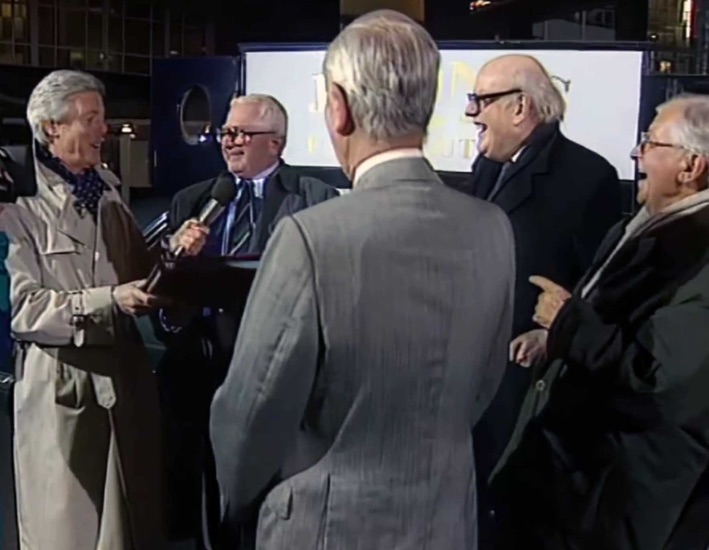




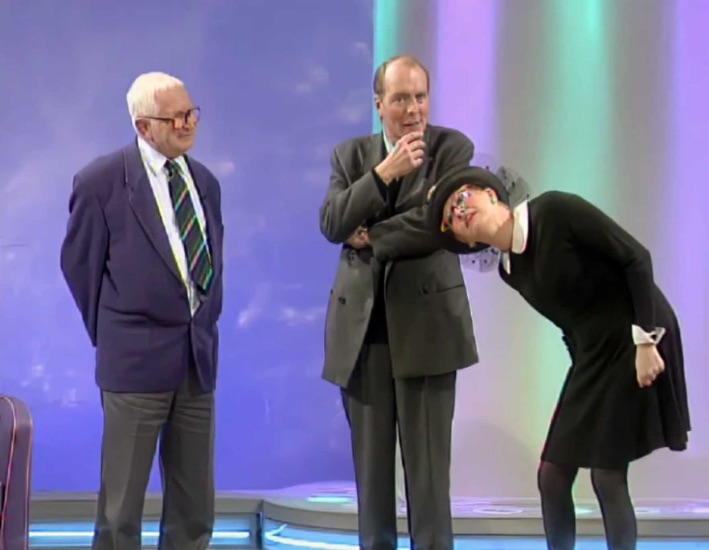
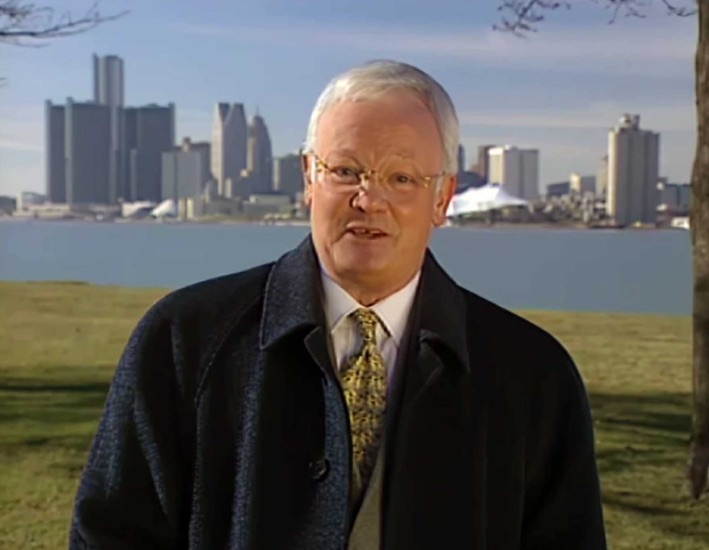
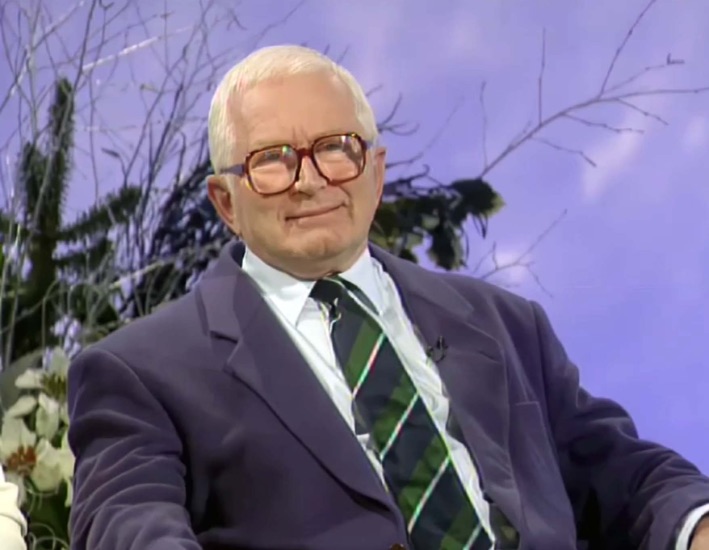
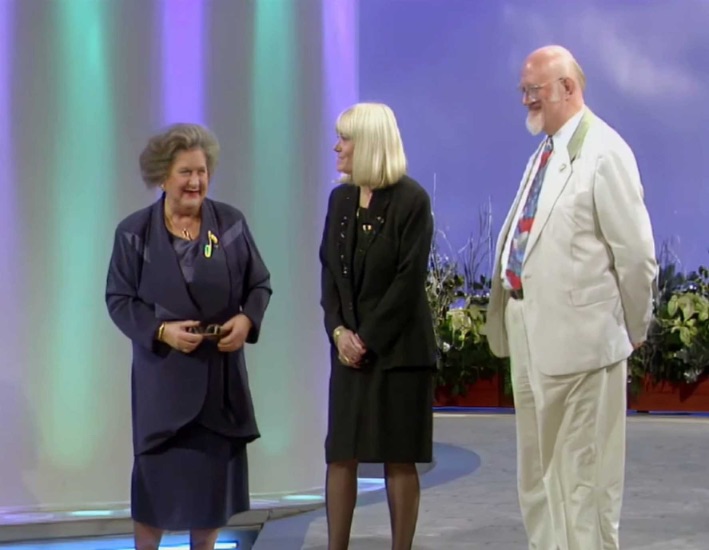
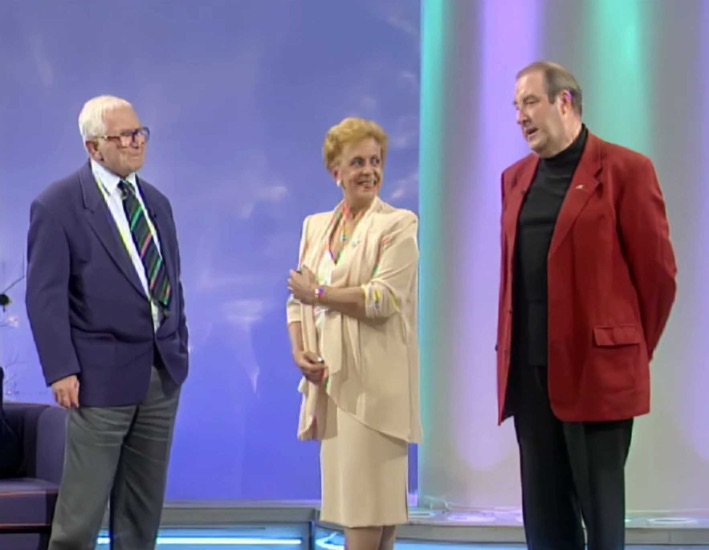
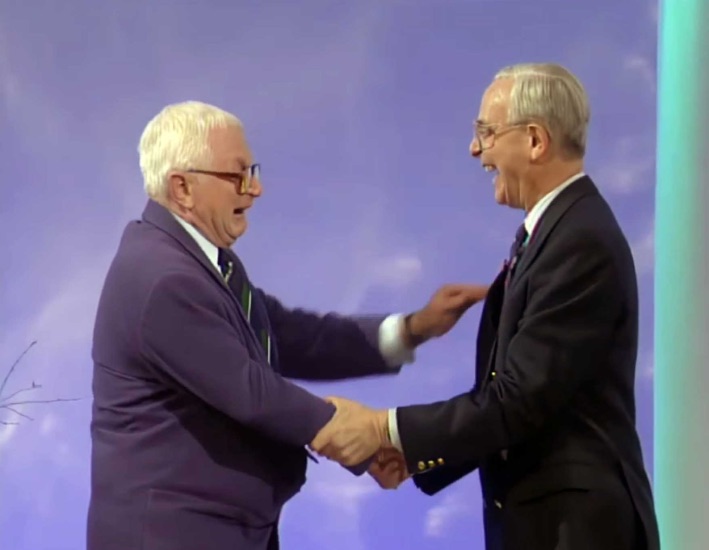
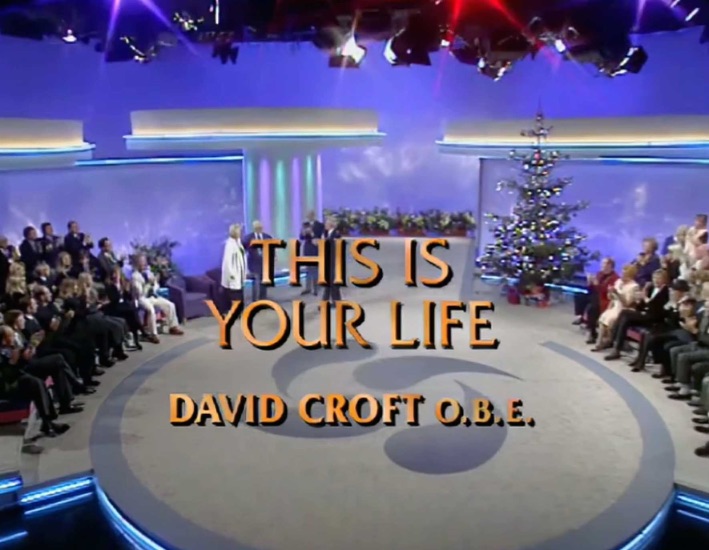
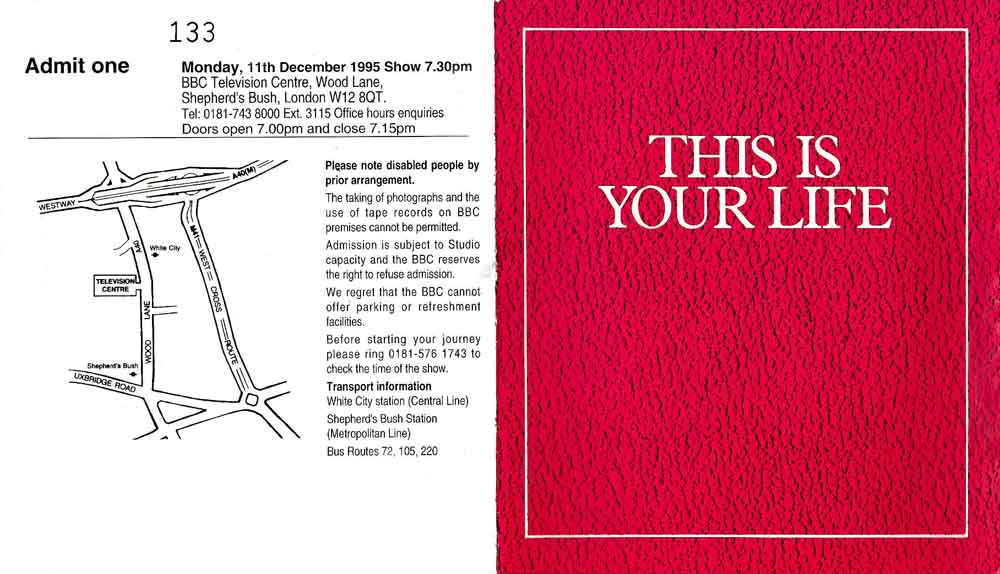
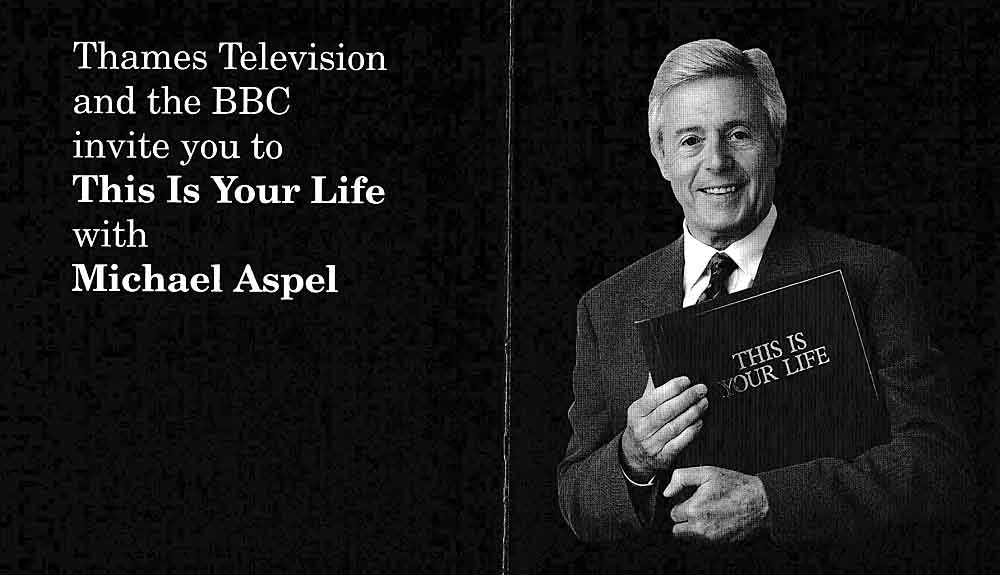
Screenshots of David Croft This Is Your Life and a rare audience ticket from the recording
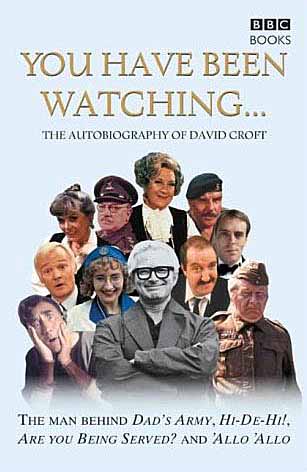
It was a fair cop. I should have seen the signs – there were plenty that I might have noticed if I hadn't gone around in a dream world. In the first place there was Ann. After being married to her for forty-something years I should have detected the subtle unease in her manner. One day whilst we were in Portugal she had been unusually keen to get me out of the house and down to the market in Cabanes to get the shopping.
Then there was the car that the BBC sent to take me to what I believed was to be a meeting about Australian rights. Usually I get what they optimistically call a 'VIP' car. It is always liberally strewn with cigarette butts, the door is tied on with hairy string, and it is driven by a man who doesn't know his Arsenal from his Eltham. This car was a large, gleaming Mercedes. The driver was in uniform and wearing a chauffeur's hat. And why was he driving so slowly? Even an old diesel taxi passed us. 'It's murder on the road these days,' he said. 'Cameras, police cars, everything. I can't afford to lose my licence – it's my living.' This was followed by a hushed conversation on the car phone. I could only catch the odd words like 'early' and 'five minutes'.
As we turned right into the main entrance of the BBC the barrier went up as though we were expected. They can't have recognised me – they never do. The second barrier went up as if by magic and we were climbing the rise to the main entrance. A couple of 5K lamps were providing a pool of light, so somebody was filming something. Through the windscreen I could see something suspiciously like Jones's butcher's van. Now even I began to take notice. Bill Pertwee... was running towards the car with his hand held up and he was shouting, 'What are you doing here? Stop! Stop!'....I could see a camera being pointed my way and Michael Aspel, carrying a big red book under his arm, was saying 'David Croft, OBE – this is your life!'
I mumbled something like, 'Well I never', and then, before I knew what was happening, a production manager was whisking me past the grinning receptionists and down the corridor towards the dressing room. There was barely time for a couple of puffs on my nitrite spray to ward off the unlikely arrival of an angina attack before they sat me down and the production manager was popping a cork and doling out a glass of champagne – not my favourite drink but very welcome nevertheless.
There was no time to collect my thoughts. The production manager had been specially selected to prattle on endlessly to stunned victims of this programme. I should know. I had directed a dozen of them in the early 1960s when I was being punished by Tom Sloan, head of light entertainment, for not getting on with Benny Hill. Mercifully the lad excused himself and, with a plea to me not to peep outside because I might see some of the people who were going to be on the show, he left me alone for a few minutes. A couple more puffs and a few moments to think.
Another glass of champagne and a brush of the usual brown stuff from the make-up department and I am standing all alone behind the familiar set of The Life. And now they are playing the music. A frantic gesture from the production manager, another couple of puffs of the nitrite – this would be a rotten moment to have a heart attack and keel over – and I am on...
This Is Your Life was brilliant. It was carefully and thoughtfully prepared, concentrated mainly on the show business side of my life and ran for 45 minutes. The edited programme ran to 30 minutes.
I directed alternate weeks with Yvonne Littlewood under T. Leslie Jackson, who was the legendary producer of the series. I directed 'Lifes' for Kenneth Horne, Coco the Clown, Madame Rambert and several brave Englishmen and nursing sisters who had massaged polio victims from sickness to health.
I found the 'casting' of real-life characters fascinating. There was one very brave naval officer who became an MP. At an early age his father sent him to Spain to view the civil war and get shot at because it would be good experience for him. He then sent him on a wind-jammer to get some experience 'before the mast'. At the rehearsal of the subsidiary characters that we held the day before transmission I was fascinated to see what the captain of the wind-jammer would look like. I was expecting someone like James Robertson Justice. He looked like a grocer.
The MP had later failed to torpedo a destroyer and, having run out of ammunition, he rammed the enemy vessel with his motor torpedo boat, sank and promptly got himself captured. He then escaped from POW camp disguised as 'Captain Burgaroff' and we succeeded in finding the SS officer who recaptured him. The SS officer was even kind enough to look roughly like an SS officer. I had no idea what attitude the brave MP would take. It could be quite dramatic. The great moment arrived. 'Here is the very SS officer who arrested you back into captivity all those years ago,' said Eamonn Andrews. Enter the German officer. He approached the MP, who stretched out his hand. 'How frightfully nice to meet you again, old chap,' he said.
To liven the show up a bit, Jackson the producer rightly decided to change the scenery. Instead of the large affair with a grand mid-set entrance, which they later reverted to, he decided to make a set appropriate for the personality being featured. Thus Madame Rambert had a ballet studio with barres and Coco the Clown had a circus tent. The ultimate came when we featured a brave Englishman who had been torpedoed in the south Atlantic. He had then spent several weeks in a life-raft while, one by one, his fellow sailors dropped off into the ocean. For this we had two large back-projection screens. On each screen we showed moving pictures of the surging, rolling, foaming South Atlantic. The result was that on every monitor in the gallery I had pictures of people in front of an exceedingly rough sea. About ten minutes into the programme I didn't know where to look. I was feeling very, very seasick. The brave seaman was completely unmoved by the proceeding and not a shadow of emotion crossed his British countenance. I had in reserve a great device on the front of one of the circle cameras. It was an outside broadcast camera and had an amazing zoom that would take the shot from a wide angle to a tight close-up at the plunge of a lever. We also had a really great research team on the show. They had managed to find the captain of the submarine who actually torpedoed the sailor. The critical moment arrived. Eamonn Andrews made the announcement, and the submarine commander made his dramatic entrance. 'Zoom in!' I yelled from the gallery. The lever was plunged. We zoomed in on the sailor's face. Nothing! He remained totally unmoved.
The shows were all live. The professionalism of Eamonn Andrews was breathtaking. He had a large clock in his eye-line and somehow he brought every show out to time. It was a nerve-racking show to direct. Time after time I would cue the inserts that were all on film and required a ten-second run-up to get them running to speed. The contributors would then remember another gem that they had forgotten and I would be yelling, 'Hold telecine! Hold telecine!'
Series 36 subjects
Rolf Harris | Lisa Clayton | Pam St Clement | Allan Norman | Alicia Markova | Tony Warren | Johnny Cooper | Clive MantleCharlie Drake | Stan Boardman | Frank Skinner | Desmond Llewelyn | Brian Conley | David Kennett | David Essex | David Croft
Bob and Dolores Hope | John Virgo | Rula Lenska | Gavin Hastings | John Peel | Ann Rachlin | Michael Buerk | Chili Bouchier
Benny Green | Sue Barker | Petula Clark